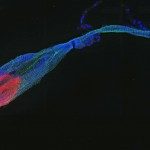Link to Pubmed [PMID] – 11116433
Parasite Immunol. 2000 Nov;22(11):535-43
The Pf72/Hsp70-1 antigen is a major target in the naturally acquired immunity against Plasmodium falciparum malaria. We carried out an extensive analysis of the responses to several epitopes on the least conserved C-terminal domain, according to the mode of sensitization: malaria infection or immunization with different immunogens. We found significant differences in the panel of B-cell epitopes recognized by animal models including primates, and by humans sensitized by natural infection. We focused the analysis on one epitope that is unique to Plasmodium species. It is specifically recognized by a monoclonal antibody that mediates the killing of infected hepatocytes in vitro. We produced a polymeric multiple antigenic peptide (MAP) form of this sequence, which enabled us to identify a new B-cell epitope not detected by ELISA with linear peptides. The polymer was strongly recognized by sera from monkeys or humans sensitized by natural infection, whereas the monomer was not. We modelled the three-dimensional structure of the Pf72/Hsp70-1 sequence, using known Escherischia coli DnaK structures as a template. This predicted that the corresponding region would form a loop in the native antigen. The results presented here suggest that the MAP strategy is also particularly useful as a means of obtaining suitable synthetic models for conformation-dependent epitopes.

